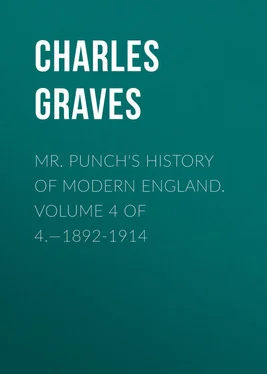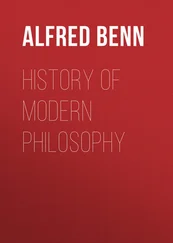Charles Graves - Mr. Punch's History of Modern England. Volume 4 of 4.—1892-1914
Здесь есть возможность читать онлайн «Charles Graves - Mr. Punch's History of Modern England. Volume 4 of 4.—1892-1914» — ознакомительный отрывок электронной книги совершенно бесплатно, а после прочтения отрывка купить полную версию. В некоторых случаях можно слушать аудио, скачать через торрент в формате fb2 и присутствует краткое содержание. ISBN: , Издательство: Иностранный паблик, Жанр: foreign_prose, foreign_humor, на английском языке. Описание произведения, (предисловие) а так же отзывы посетителей доступны на портале библиотеки ЛибКат.
- Название:Mr. Punch's History of Modern England. Volume 4 of 4.—1892-1914
- Автор:
- Издательство:Иностранный паблик
- Жанр:
- Год:неизвестен
- ISBN:http://www.gutenberg.org/ebooks/48405
- Рейтинг книги:5 / 5. Голосов: 1
-
Избранное:Добавить в избранное
- Отзывы:
-
Ваша оценка:
- 100
- 1
- 2
- 3
- 4
- 5
Mr. Punch's History of Modern England. Volume 4 of 4.—1892-1914: краткое содержание, описание и аннотация
Предлагаем к чтению аннотацию, описание, краткое содержание или предисловие (зависит от того, что написал сам автор книги «Mr. Punch's History of Modern England. Volume 4 of 4.—1892-1914»). Если вы не нашли необходимую информацию о книге — напишите в комментариях, мы постараемся отыскать её.
Mr. Punch's History of Modern England. Volume 4 of 4.—1892-1914 — читать онлайн ознакомительный отрывок
Ниже представлен текст книги, разбитый по страницам. Система сохранения места последней прочитанной страницы, позволяет с удобством читать онлайн бесплатно книгу «Mr. Punch's History of Modern England. Volume 4 of 4.—1892-1914», без необходимости каждый раз заново искать на чём Вы остановились. Поставьте закладку, и сможете в любой момент перейти на страницу, на которой закончили чтение.
Интервал:
Закладка:
But is there, as you say, "in the American heart a hatred of England, which glutted itself in her imagined disaster and disgrace when we all read the President's swaggering proclamation, in which he would not yield to the enemy so far as even to write good English"? Is there to be no forgiveness, are we never to cancel old scores and begin our international book-keeping, if I may so term it, on a clean page? I do not think our people hate yours. Your dash, your pluck, your humour, your keen common sense, your breezy and inexhaustible energy, your strength and broad capacity for government, all these qualities command and obtain from us a sincere tribute of admiration. If you hate us, we must submit to that melancholy condition, but never submit in such a fashion as to cease from honest effort to abate and in the end to remove all hatred. Blood, as one of your naval captains 1 1 Josiah Tatnall, flag-officer of the East India Squadron in 1856.
said on a memorable occasion, is thicker than water. So saying, he dashed in to the help of our sorely pressed ships. Let us then call a truce to petty and malignant carping, and join hands in an alliance dependent not upon written treaties, but upon the noble sympathy of two great nations engaged in the same work of civilization and progress. You, Sir, speaking for others, I trust, as well as for yourself, have set us an example.
Believe me, yours in all cordial friendship,
Punch.
It was in the same spirit that Punch welcomed a remark in the New York Morning Press : "After all the English people are our people, and we are theirs," and deprecated as suicidal any efforts to forsake a common heritage and rend asunder a family tree. The tension passed, thanks to diplomacy and arbitration, and towards the close of the year we find Punch welcoming Mr. McKinley on his election as President, the Shade of Washington (with a somewhat bulbous nose) congratulating Columbia: "'Sound Money' is the best policy." Meanwhile the expedition to Khartum had been decided on; the House of Commons, reassured by a confident speech from Mr. Chamberlain, having approved of the forward policy by a two to one vote, in spite of the misgivings of Mr. Morley, Sir William Harcourt and Sir Charles Dilke. Punch , mindful of 1884, registered his approval in the cartoon in which the Shade of Gordon in the desert utters the one word, "Remember!" Wars and rumours of wars did not distract Punch's attention from the peaceful rivalry of commerce. He was still much concerned by Germany's competition, which he typified in his cartoon of British Trade as the old woman whose petticoats were "cut all round about," while she was asleep, by a German pedlar. And the commercial significance of Li Hung Chang's visit is not overlooked in the generally farcical handling of that extremely astute Oriental. In the cartoon "China in the Bull Shop," rival Continental shopkeepers, who had got no orders out of him, are consumed with envy and curiosity. If Punch is to be believed, their envy was ill-founded. Li Hung Chang displayed a boundless inquisitiveness, but there was "nothing doing" in the way of business between him and his hosts. Punch drew mainly on his imagination for the events of the visit, and ascribed to Li Hung Chang a number of topical Chinese proverbs. The best of them – "Half an official welcome is better than an ill-bred mobbing" – refers to his arrival in the "dead" season.
Two Modern Hamlets
Lord Rosebery resigned the leadership of the Liberal Party in June. While still in office he had estranged the Radical stalwarts by his Imperialist foreign policy and his heretical view of the necessity of converting the "predominant partner," England, before attempting to revive Home Rule. His Government, as one of his colleagues put it, were condemned to the task of "ploughing the sands." In the intervening year the gulf that severed him from the stalwarts and the Nonconformist conscience had been widened by his refusal to join in Mr. Gladstone's Armenian crusade, and henceforth he decided to "plough a lonely furrow." In later years he made occasional dramatic interventions, but his official career, like that of his contemporary at Eton, Lord Randolph Churchill, closed before he was fifty.
Lord R-s-b-ry (in leading rôle):
"The 'Party's' out of joint; – O, cursèd spite,
That ever I was 'asked' to set it right!"
Our relations with the United States were bettered at the opening of 1897 by the signing of the Arbitration Treaty adjusting the Venezuelan question. In Europe events did not conduce to diminish our unpopularity. It was the year of the brief Greco-Turkish war, which revived old divisions of opinion at home. Punch was no lover of the Turk; he realized the difficulties of King George, whom he depicted as Hamlet at Athens, recognizing (like Lord Rosebery) that the "time was out of joint" and deploring "the cursed spite that he was ever born to set it right"; but he supported Lord Salisbury in severely rebuking the hundred M.P.'s who had sent the King a message of encouragement. The verses, modelled on Tennyson's "Charge of the Light Brigade," disparaged the message as mere gaseous talk, which did not mean business, and was bound to end in smoke. Criticism of the Kaiser becomes more animated than moderate; the frequent prosecutions for lèse-majesté , and the famous pamphlet, in which Professor Quidde of Munich ingeniously satirized the Kaiser's megalomania in an historical essay on the aberrations of Caligula, inspire a caustic open letter to Wilhelm II, the gist of which is that, though old enough to know better, he was still the victim of the capricious extravagance of youth: —
Formerly I imagined that throughout Germany, and from time to time in Russia, Austria, or in Italy, an imperial but soaringly human boy was lifting his glass and crying, "Hoch! Hoch! Hoch!" amid the clatter of swords and the admiring shouts of a profusely-decorated soldiery. Now I know that a stout gentleman is doing these things, and reducing his hearers to an abyss of melancholy at his dismal failure in dignity. A boy who played fantastic tricks with the telegraph-wires incurred but a mild censure. What shall be said of a middle-aged and pompous party whose pleasure it is to play practical jokes that set two nations by the ears?
The "Raid" and its Aftermath
Yours is a great inheritance, greatly won by heroic deeds. Your people are by nature the mildest and most loyal, and by tradition and education the most thoughtful, in Europe. But mild and loyal as they are their minds must rise in revolt against a sovereign who reproduces in the crudest form the stale theories of divine right and arbitrary government, whose one notion of administration is to increase his stupendous military forces by taxation while diminishing the number of his reasonable critics by imprisonment. You have travelled, cocked hat in hand, to capital after capital, you have dismissed Bismarck, you have made yourself into the tin god of a great monarchy, you have shouted, reviewed, toasted, speechified, you have donned a thousand different uniforms, you have dabbled in the drama, you have been assisted in the design of allegorical cartoons, you have composed hymns to Ægir, and Heaven knows how many others – and to-day the result of all your restless and misdirected energies is that you have added not only to your army but also to the foreign ill-wishers of your country and to her internal distractions. And at this moment, in spite of the millions of men and money that go to form her army, Germany is weaker than she has been at any moment since the Empire was proclaimed at Versailles. This feat, Sir, you have accomplished, and such credit as attaches to it is yours alone. Where and how do you propose to end?
Читать дальшеИнтервал:
Закладка:
Похожие книги на «Mr. Punch's History of Modern England. Volume 4 of 4.—1892-1914»
Представляем Вашему вниманию похожие книги на «Mr. Punch's History of Modern England. Volume 4 of 4.—1892-1914» списком для выбора. Мы отобрали схожую по названию и смыслу литературу в надежде предоставить читателям больше вариантов отыскать новые, интересные, ещё непрочитанные произведения.
Обсуждение, отзывы о книге «Mr. Punch's History of Modern England. Volume 4 of 4.—1892-1914» и просто собственные мнения читателей. Оставьте ваши комментарии, напишите, что Вы думаете о произведении, его смысле или главных героях. Укажите что конкретно понравилось, а что нет, и почему Вы так считаете.












